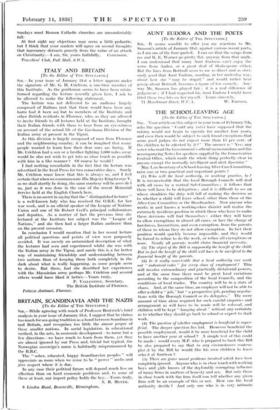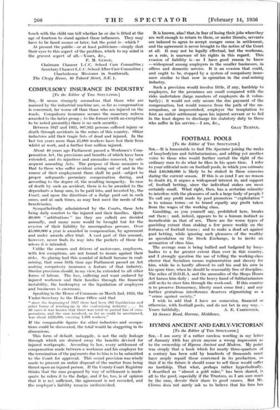THE SCHOOL-LEAVING AGE
[To the Editor of THE SPECTATOR.] Sat,--Your article on this subject in your issue of February 7th, asks the question " Could any voter have supposed that the raising would not begin to operate for another four years, and even then would be subject. to such broad exceptions that some good judges do not expect more than 15 per cent. of the children to be affected by it ?" The answer is " Yes: any voter who read the Government's official meniorandun► and the accompanying Notes for speakers supplied by the Conservative Central Office, which made the whole thing perfectly clear to anyone except the normally intelligent and alert Spectator."
May I, as Secretary of a School-leaving After-Care Committee, raise one or two practical and important points ?
(1) Who will the local authority, in working practice, be ? It is inconceivable that the local Borough Councils will deal with all cases by a central Sub-Committee ; it follows that there will have to be delegation ; and it is difficult to see on whose shoulders the duty will fall of making the decisi as to whether a child will leave school, other than those of the After-Care Committee or the Ileadteacher. Now anyone who works in and knows a working-class district will realise the extremely invidious position in which those who have to make these decisions will find themselves : either they will have to allow exemptions in almost all cases, or face the charge of harshness, favouritism, and even corruption, from the parents of those to whom they do not allow exemption. In fact. their position would quickly become impossible, and they would be forced to refuse to do the work, or refuse all exemptions or none. Nearly all parents would claim financial necessity.
(2) The object of the Bill is supposedly the benefit of the child. But in fact the benefit of the child will have to be sacrificed to the financial benefit of the parents.
(3) Is it really conceivable that a local authority can work out " industrial codes" for every class of employment ? This will involve extraordinary and practically dictatorial powers, and at the same time there must be great local variations according to the composition of the local Councils, and the conditions of local trades. The country will be in a state of chaos. And, at the same time, an employer will not be able to offer a child a " job," but " a prospective job, pending negotia- tions with the Borough Council or its delegates." The mere amount of time alone required for such careful enquiries and arrangement as will have to be made will be colossal, and children will be kept " hanging about " without any certainty as to whether they should go back to school or expect to start work.
(4) The question of whether employment is beneficial is super- ficial. The deeper question lies hid. However beneficial the possible employment, would it be more beneficial for the child to have another year at school ? A simple test of this could he made : would every M.P. who is prepared to back this Bill be also prepared to say that in any circumstances content- plat-A by the Bill he would like his own children to leave scho.►l at fourteen ?
(5) There are grave moral problems involved which have been completely ignored. Anyone who is in close touch with working boys and girls knows of the deplorably corrupting influence of many firms in matters of honesty and sex. But only those in close touch with the firm itself can tell whether any given firm will be an example of this or not. How can the local authority decide ? And only one who is in very intimate touch with the child can tell whether he or she is fitted at the age of fourteen to stand against these influences. They may have to be faced sooner or later, but the point is—which ?
At present the public—or at least politicians—simply shut their eyes to this aspect of the problem, which to my mind is the gravest, aspect of all.—Yours, &c., P. M. GEDGE, Chairman Chaucer L.C.C. School Care Committee ; Secretary Chaucer L.C.C. School After-Care Committee ; Charterhouse Missioner in Southwark. The Clergy House, 40 Tabard Street, S.E. 1.















































 Previous page
Previous page